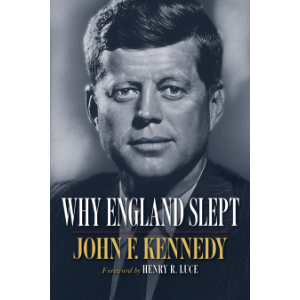

Why England Slept
John F. Kennedy
“England made many mistakes; she is paying heavily for them now. In studying the reasons why England slept, let us try to profit by them and save ourselves her anguish.” – John F. Kennedy
In 1938, British statesman and soon-to-be Prime Minister Winston Churchill published his book Arms and the Covenant. It was published three months later in the United States under the title While England Slept; A Survey of World Affairs, 1932-1938.
In While England Slept, Churchill emphasized the United Kingdom's lack of military preparation to face the threat of Nazi Germany's Anschluss and expansion, and argued against the appeasement policies of the British government, led by Prime Minister Neville Chamberlain, who said "Peace for our time." The book spurred many English citizens to oppose the dovish philosophy of the Munich Agreement, and in doing so, Churchill singlehandedly changed the course of history.
In 1940, future President of the United States, John F. Kennedy, who was a senior at Harvard University, wrote his dissertation, criticizing Churchill’s harsh blame of England’s leaders, even drawing comparisons between England and the United States for its own similar lack of preparedness against the totalitarian Nazi regime.
Responding to Churchill's title, Kennedy named his book, Why England Slept.
Discover all of this and more in this deluxe original classic 1940 edition of the work that includes the original foreword by Henry R. Luce.
“To say that all the blame must rest on the shoulders of Neville Chamberlain or of Stanley Baldwin, is to overlook the obvious. As the leaders, they are, of course, gravely and seriously responsible. But, given the conditions of democratic government… it is unreasonable to blame the entire situation on one man or group.” – JFK
Duration - 4h 52m.
Author - John F. Kennedy.
Narrator - AJ Crozby.
Published Date - Thursday, 04 January 2024.
Copyright - © 2024 Maple Spring Publishing ©.
Location:
United States
Networks:
John F. Kennedy
AJ Crozby
Maple Spring Publishing
English Audiobooks
Findaway Audiobooks
INAudio Audiobooks
Description:
“England made many mistakes; she is paying heavily for them now. In studying the reasons why England slept, let us try to profit by them and save ourselves her anguish.” – John F. Kennedy In 1938, British statesman and soon-to-be Prime Minister Winston Churchill published his book Arms and the Covenant. It was published three months later in the United States under the title While England Slept; A Survey of World Affairs, 1932-1938. In While England Slept, Churchill emphasized the United Kingdom's lack of military preparation to face the threat of Nazi Germany's Anschluss and expansion, and argued against the appeasement policies of the British government, led by Prime Minister Neville Chamberlain, who said "Peace for our time." The book spurred many English citizens to oppose the dovish philosophy of the Munich Agreement, and in doing so, Churchill singlehandedly changed the course of history. In 1940, future President of the United States, John F. Kennedy, who was a senior at Harvard University, wrote his dissertation, criticizing Churchill’s harsh blame of England’s leaders, even drawing comparisons between England and the United States for its own similar lack of preparedness against the totalitarian Nazi regime. Responding to Churchill's title, Kennedy named his book, Why England Slept. Discover all of this and more in this deluxe original classic 1940 edition of the work that includes the original foreword by Henry R. Luce. “To say that all the blame must rest on the shoulders of Neville Chamberlain or of Stanley Baldwin, is to overlook the obvious. As the leaders, they are, of course, gravely and seriously responsible. But, given the conditions of democratic government… it is unreasonable to blame the entire situation on one man or group.” – JFK Duration - 4h 52m. Author - John F. Kennedy. Narrator - AJ Crozby. Published Date - Thursday, 04 January 2024. Copyright - © 2024 Maple Spring Publishing ©.
Language:
English
Opening Credits
Duration:00:00:27
Dedication
Duration:00:00:05
Acknowledgment
Duration:00:00:56
Foreword
Duration:00:11:54
Introduction
Duration:00:10:06
Part One: Chapter 1: Certain Fundamental Beliefs of the British Regarding Armaments
Duration:00:24:31
Part One: Chapter 2: Influence of the Financial Crisis on Armaments, 1931–32
Duration:00:19:29
Part One: Chapter 3: Influence of the General Disarmament Conference and the Pacifist Movement on British Armaments, 1933
Duration:00:22:47
Part One: Chapter 4: Beginnings of the Shift from Disarmament to Rearmament, 1934
Duration:00:33:20
Part One: Chapter 5: Influence of the General Election—Final Phase of Disarmament
Duration:00:30:10
Part Two: Chapter 6: The Launching of the Rearmament Program, 1936
Duration:00:39:53
Part Two: Chapter 7: Slowness of Fulfillment of the Program, 1937
Duration:00:21:18
Part Two: Chapter 8: The Penalty—Munich, 1938
Duration:00:36:45
Part Two: Chapter 9: The Aftermath—Britain Awakens
Duration:00:20:55
Part Three: Chapter 10: America's Lesson
Duration:00:19:40
Ending Credits
Duration:00:00:27